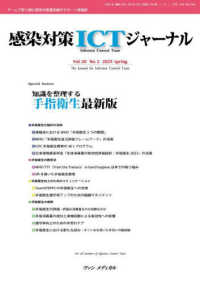- ホーム
- > 洋書
- > 英文書
- > Religion / Ethics
Full Description
One of the most basic questions for any legal system is that of methodology: how one interprets, analyzes, weighs, and applies a mass of often competing legal rules, precedents, practices, customs, and traditions to reach final determinations and practical guidance about the correct legal-prescribed course of action in any given situation. Questions of legal methodology raise not only practical concerns, but theoretical and philosophical ones as well. We expect law to be more than the arbitrary result of a given decision maker's personal preferences, and so we demand that legal methodologies be principled as well as practical. These issues are especially acute in religious legal systems, where the stakes are raised by concerns for respecting not just human, but divine law. Despite this, the major scholars and codifiers of halakhah, or Jewish law, have only rarely explicated their own methods for reaching principled legal decisions. This book explains the major jurisprudential factors driving the halakhic jurisprudence of Rabbi Yehiel Mikhel Epstein, twentieth-century author of the Arukh Hashulchan-the most comprehensive, seminal, and original modern restatement of Jewish law since Maimonides. Reasoning inductively from a broad review of hundreds of rulings from the Orach Chaim section of the Arukh Hashulchan, the book teases out and explicates ten core halakhic principles that animate Rabbi Epstein's halakhic decision-making. Along the way, it compares the Arukh Hashulchan methodology to that of the Mishna Berura. This book will help any reader understand important methodological issues in both Jewish and general jurisprudence.
Contents
Introduction
Part One: Setting the Table: The Codification of Jewish Law
1. Codifying Jewish Law
2. Rabbi Yechiel Mikhel Epstein's Arukh HaShulhan
3. Competing Models: The Arukh HaShulhan and Mishnah Berurah
Part Two: The Methodological Principles of the Arukh HaShulhan
Introduction
4. The Rule of the Talmud
5. Rabbinic Consensus
6. Resolving Doubtful Cases
7. Non-Normative Opinions
8. Superogatory Religious Conduct
9. Law and Mysticism
10. Law and Custom
11. Temporal Rationalization of Halakhic Rules
12. Law and Pragmatism
Conclusion
Part Three: Illustrative Examples from the Arukh HaShulhan
The Arukh HaShulhan's Methodological Principles for Reaching Halakhic Conclusions
Bibliography
Index








